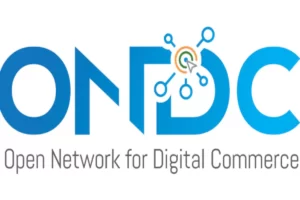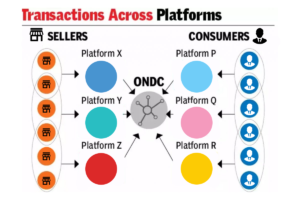In an effort to democratise online business, the government introduced the Open Network for Digital Commerce (ONDC) project in April of last year. Small businesses can sell their goods or services directly to clients thanks to ONDC’s open-sourced business model.
🚨 ONDC is the Talk of the Town
I’ve shared earlier on offerings & if ONDC can create UPI like disruption for e-Commerce
Today, let’s Uncover Practicality & After Effects pic.twitter.com/arubL2NPXo
— Ravisutanjani (@Ravisutanjani) May 7, 2023
So what is it? NewsHamster takes a deep dive into the model poised to disrupt Zomato and Swiggy model!
What is ONDC?
The Department of Promotion of Industry and Internal Trade (DPIIT) of the Ministry of Commerce introduced the ONDC open e-commerce protocol. The network makes it possible for buyers and sellers to communicate with one another without a third-party application. Customers utilising any of the partner applications nationwide can see sellers through ONDC.

Image Source: Firstpost
How does it benefit customers?
Customers can look through and purchase various goods from different brands and small businesses. Buyers have access to various goods through ONDC, including those in the food and beverage, personal care, home and décor, technology, and fashion sectors.

Image Source: Pirimid Fintech
To shop through the platform, customers can open buyer applications like Paytm, Mystore, Craftsvilla, Spice Money, Meesho, Magicpin, and Pincode. Simply launch the buyer application and conduct a product search to find the needed item. Based on the customer’s location, the programme also displays the neighbouring neighbourhood shops and merchants. One can look up prices and place an order after choosing a store.
What are the benefits for the sellers?
Through ONDC, vendors and small enterprises can compete with e-commerce behemoths like Flipkart and Amazon. The network increases its reach by making them accessible to clients online. Buyers and sellers can conduct a transaction on the platform without being on the same application. A seller can conduct business using any ONDC-compatible application and is not subject to the rules established by an e-commerce platform.

Image Source: Fisdom
What is the significance of the platform?
Minister of Commerce and Industry Piyush Goyal claims the platform will “help our small retail survive the onslaught of large tech-based e-commerce companies”. According to the minister, it will democratise e-commerce’s advantages as UPI democratises payment methods.7

Piyush Goyal
Credits:- Mint
Customers may shop for anything from their favoured local business or any other store thanks to the platform, which was created to make the e-commerce space more inclusive and accessible for them. The network also attempts to standardise processes, including inventory management, order fulfilment, order management, and cataloguing.



















































































